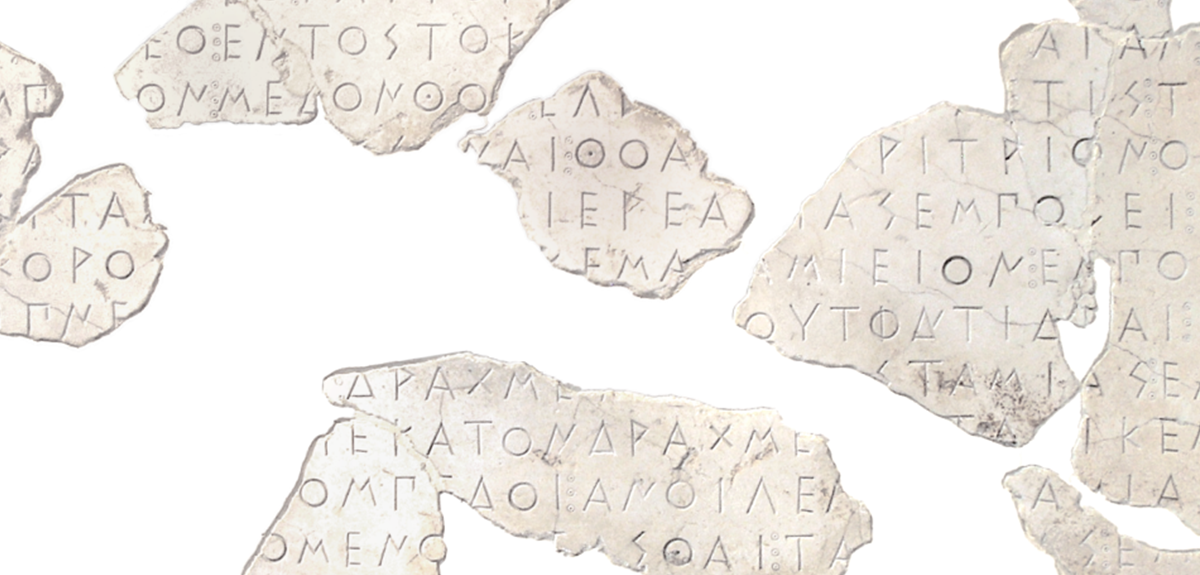
Oxford historians apply state-of-the-art AI to transform the study of ancient texts
Researchers in the Classics Faculty of the University of Oxford in collaboration with the Department of Humanities of Ca' Foscari University of Venice, the Department of Informatics of the Athens University of Economics and Business, and Google’s DeepMind have begun applying state-of-the-art machine learning research to transform the study of ancient Greek texts.
Ithaca is the first deep neural network that can aid historians in not only restoring the missing text of damaged inscriptions, but also identifying their original location, and establishing the date they were written.
In a new research paper, published today by the scientific journal, Nature, the researchers have already used Ithaca to redate a series of important Athenian decrees from the 5th century BCE.
Jonathan Prag, Professor of Ancient History, Faculty of Classics at the University of Oxford said:
‘The huge quantity of evidence from the ancient world, whether texts or objects, keeps on growing, and is increasingly beyond the scope of individual historians to master, even as we work to make sense of it and to make it more accessible. The application of AI to this data, as Ithaca demonstrates, presents incredible opportunities – ancient history has an exciting future.’
Using the new model the research team has shed light on current disputes in Greek history, including the dating of a series of important Athenian decrees thought to have been written before 446/445 BCE. New evidence recently presented by historians suggests the 420s BCE as a more appropriate time period. Remarkably, Ithaca’s average predicted date for the decrees is 421 BCE, aligning with the new evidence and demonstrating how machine learning might contribute to historical debates.
Thea Sommerschield, Marie Curie Fellow at Ca' Foscari University of Venice and fellow at Harvard University’s CHS, formerly in the Faculty of Classics, University of Oxford said:
Although it might seem like a small difference, this date shift has significant implications for our understanding of the political history of Classical Athens. We hope that models like Ithaca can unlock the cooperative potential between AI and the humanities, transforming the way we study and write about some of the most significant periods in human history.
Jonathan Prag, Professor of Ancient History, Faculty of Classics at the University of Oxford
Many ancient inscriptions have been damaged to the point of illegibility and transported far from their original location, leaving their date of origin steeped in uncertainty. Ithaca, named after the Greek island in Homer’s Odyssey, may assist the restoration and attribution of newly discovered or uncertain inscriptions. The system is trained on the largest digital dataset of Greek inscriptions from the Packard Humanities Institute. It builds upon and extends Pythia, a system built by DeepMind and Oxford University that focuses solely on textual restoration.
The model was designed with collaboration in mind and is best used in conjunction with researchers where historical knowledge combines with Ithaca’s assistive input. While Ithaca alone achieves 62% accuracy when restoring damaged texts, when historians use it their performance leaps from 25% to 72%. Ithaca can also attribute inscriptions to their original location with 71% accuracy and date them with less than 30 years from ground-truth ranges.
Yannis Assael, Staff Research Scientist, DeepMind said:
‘We believe machine learning could support historians to expand and deepen our understanding of ancient history, just as microscopes and telescopes have extended the realm of science. Ancient Greece plays an instrumental role in our understanding of the Mediterranean world, but it’s still only one part of a vast global picture of civilisations that we could explore.’
The team is currently working on versions of Ithaca trained on other ancient languages and historians can already use their datasets in the current architecture to study other ancient writing systems, from Akkadian to Demotic and Hebrew to Mayan.
To make the research widely available to researchers, educators, museum staff and others, DeepMind has partnered with Google Cloud and Google Arts & Culture to launch a free interactive version of Ithaca. To aid further research, we have also open sourced our code, the pretrained model, and an interactive Collaboratory notebook.
Read the full paper published in Nature: 'Restoring and attributing ancient texts using deep neural networks': https://www.nature.com/articles/s41586-022-04448-z
 Oxford Humanities team delivers framework for tackling modern slavery and human trafficking
Oxford Humanities team delivers framework for tackling modern slavery and human trafficking
 Nearly 500,000 children could die from AIDS-related causes by 2030 without stable PEPFAR programmes, Oxford experts estimate
Nearly 500,000 children could die from AIDS-related causes by 2030 without stable PEPFAR programmes, Oxford experts estimate
 Expert Comment: Why has Trump launched so many tariffs and will it cause a recession?
Expert Comment: Why has Trump launched so many tariffs and will it cause a recession?